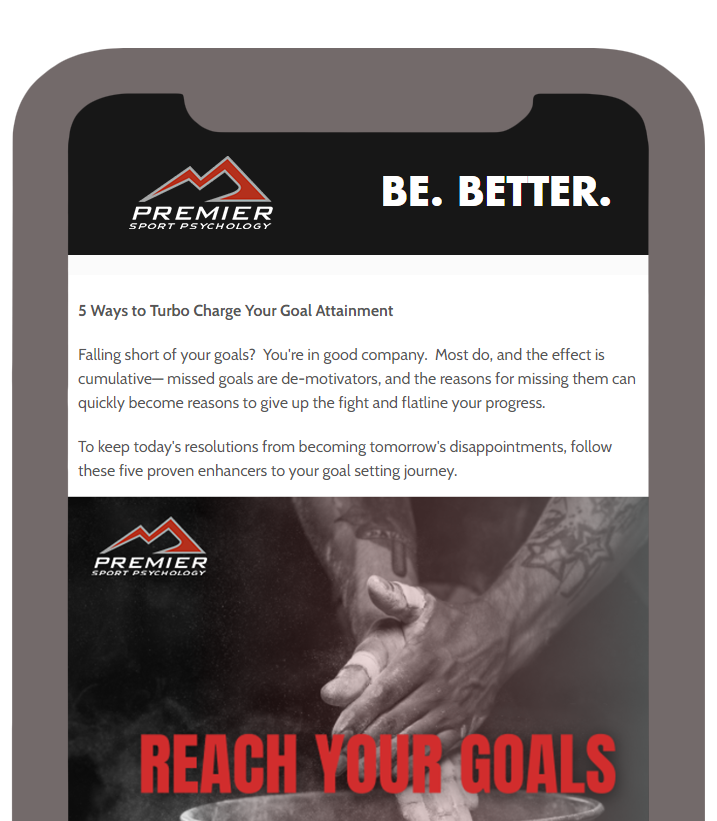ADHD AND ATHLETICS
What it means to you, your training, and your mental health
What it means to you, your training, and your mental health
Attention–deficit/hyperactivity disorder (ADHD) is a neurocognitive disorder that begins in childhood or adolescence. It is characterized by an ongoing pattern of inattention and/or hyperactivity-impulsivity that interferes with functioning in multiple areas of life (work, school, relationships, sport, etc.).

Premier Sport Psychology provides athletes and non-athletes aged 14 and above with comprehensive testing to determine whether a diagnosis of ADHD is warranted. We also diagnose or rule out other mental health conditions such as anxiety or depression that may be contributing to attention problems. The assessment includes a report with our findings, the diagnostic decision, and recommendations for treatment.


ADHD may be more common in athletes, given that individuals with ADHD are often drawn to the pace, urgency, and positive reinforcement of competitive sports. But while sport participation can benefit those with ADHD, attention problems can negatively impact performance and persistence, and complicate coach and teammate relationships.
While some athletes with ADHD naturally excel in sport because of quick and reactive decision-making, research has also suggested that athletes with ADHD have a higher prevalence of injury, and may experience slower recoveries following sport-related concussions.
An ADHD diagnosis can help athletes manage symptoms, enhance sport enjoyment and interpersonal relationships, and reduce the associated risks to their physical and psychological wellbeing.
The symptoms of ADHD can vary from individual to individual, but tend to fall into two broad types: inattentiveness and hyperactivity. Those with ADHD may display behaviors that fall into either or both of these categories.
The exhibition of these behaviors is in no way a diagnosis itself, but it is a place to begin. If you have questions or concerns about yourself or your athlete, consider contacting us. We’re here to help.

Overlooking details or making careless mistakes; trouble paying attention; not seeming to listen when spoken to directly; getting frequently side-tracked from daily activities; avoiding tasks, like homework, that require mental effort over a long period of time; trouble with organization; and forgetfulness.

Fidgeting with or tapping hands or feet or squirming in seat; unable to play or participate in leisure activities quietly; often “on the go” or acting as if “driven by a motor;” excessive talking or interrupting; trouble waiting their turn; and chronic restlessness.
Our licensed psychologists are certified to both test for and diagnose ADHD, and currently work with student-athletes and athletic departments at the D1, D2, and D3 levels. We understand the physical and academic demands of today’s student-athletes, and have developed successful treatment plans to meet their needs.
As professionals working in the field, we are up to date on NCAA regulations, and are comfortable creating treatment strategies and drafting medical exemptions to ensure our athletes receive effective care that is NCAA-compliant.

*Premier Sport Psychology provides ADHD testing services for athletes and non-athletes alike.
First Contact
Our diagnostic sequence is designed to make testing clear and comfortable for all participants. Our staff will walk you through the testing process when a consultation is requested, including the option to schedule a free 15-minute phone call with our Director of Clinical Assessment to answer questions and determine whether ADHD testing is right for you or your child.
Clinical Interview
Your first session will be a one-hour clinical interview, where your provider will gather information to understand your/your child’s background and history of concerns, and if necessary, schedule an appointment for testing. If after this interview your provider finds no information supporting an ADHD diagnosis, this will be reported, and you can discontinue the process at no additional cost.
Testing
Testing is conducted on-site and consists of a series of 10–15-minute tasks and subtests. Testing is facilitated one-on-one by your provider or a psychometrist, and can be thought of as a collection of low-pressure, interactive puzzles and brain games. These are not bubble-tests and the majority of testing is non-written. Questions are allowed and the testing environment is both safe and accommodating. The total testing time is approximately four hours, and includes breaks. Following your testing, you will be emailed 1-2 online questionnaires that you can complete at home, at your leisure.
Feedback Session
Your final session will be a one-hour feedback session, during which we will explain our findings, the diagnostic decision, and recommended next steps. You will also be presented with a comprehensive report and documentation for medical exemptions and academic accommodations, if applicable.

Yes. Because ADHD is a developmental disorder that begins in childhood, there is no formal diagnosis of “adult ADHD.” However, absent a diagnosis in childhood, many adults find that attention problems which began in childhood are interfering substantially in their day-to-day lives. We can test for and diagnose ADHD in adults and provide recommendations for effective treatment.
Absolutely. There is nothing in the testing, diagnosis, or treatment stages of this process that is exclusive to athletes. The diagnostic process includes a combination of information gathering and on-site mental performance testing, each of which apply equally to individuals (14 years of age and up) of all interests and walks of life.
No. Medication is one of many treatment options for those diagnosed with ADHD. Your provider will discuss these options with you after your diagnosis, and work with you to find interventions with which you are comfortable.
Quite the opposite. The goal of ADHD testing is to identify and address issues that make performance in all areas of life more difficult. An ADHD diagnosis is an opportunity to make life more comfortable and performance more consistent. Whether it be in sport, academics, or the tasks of everyday life, consider it a performance enhancer.
The total cost of testing, from the clinical interview through the diagnostic decision and final report, is $2925.
An initial payment of $525 is required for records review, the collection of collateral information, and the first clinical interview. If after this interview it becomes clear that there is no information available to support an ADHD diagnosis, the process can be discontinued at no additional cost.
As an out of network provider, we do not accept or bill to insurance. However, clients may use Health Savings or Flexible Spending Accounts, or may file for partial reimbursement with their insurance providers if they so choose.
